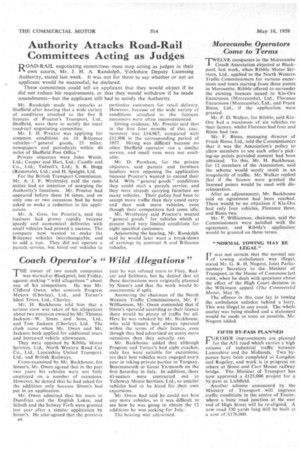Authority Attacks Road-Rail Committees Acting as Judges
Page 38

If you've noticed an error in this article please click here to report it so we can fix it.
JOAD-RAIL negotiating committees must stop acting as judges in thcir 11. own courts, Mr. J. H. A. Randolph, Yorkshire Deputy Licensing Authority, stated last week. It was not for them to say whether or not an applicant would be successful, he declared.
These committees could tell an applicant that they would object if he did not reduce his requirements, or that they would withdraw if he made amendments—but the applicant still had to satisfy the Authority.
Mr. Randolph made his remarks at Sheffield after hearing that a wide variety of conditions attached to the five B licences of Proctor's Transport, Ltd.. Sheffield, were there to satisfy the local road-rail negotiating committee.
Mr. J. H. Proctor was applying for common conditions on 10 B-licence vehicles—" general goods, 25 miles; newspapers and periodicals within 40 mites of Sheffield Post Office."
Private objectors were John Walsh, Ltd.; Cooper and Hart, Ltd.; Caudle and. Co., Ltd.; Tufnell's, Ltd.; S. B. Hogg (Removals), Ltd.; and H. Speight, Ltd.
For the British Transport Commission, Mr. A: J. F. Wrottesley said the committee had no intention of usurping the Authority's functions. Mr. Proctor had appeared before them 16 times, and on only one or two occasions had he been asked to make a reduction in his application.
Mr. A. Goss, for Proctor's, said the business had grown rapidly because speedy and economical deliveries with small vehicles had proved a success. The company now wanted to .make the B-licence vehicles interchangeable, and to add a van. They did not operate a parcels service, hut hired out vehicles to particular customers for retail delivery. However, because of the wide variety of conditions attached to the licences. customers were often inconvenienced.
Giving evidence, Mr. Proctor said that in the first four months of this year. turnover was I:14,967, compared with £11,908 in the corresponding period of 1957. Hiring was difficult because no other Sheffield operator ran a similar service, and small vans were not available.
Mr. D. Farnham, for the private objectors, said parcels and furniture hauliers were opposing the application because Proctor's wanted to extend their field. With general goods" conditions they could start a parcels service, and they were already carrying furniture on many vehicles. Their policy had been to accept more traffic than they could carry and then seek more vehicles, even though their competitors had some idle.
Mr. Wrottestcy said Proctor's wanted "general goods" for vehicles which at present had very limited conditions for eight specified customers.
Adjourning the hearing, Mr. Randolph said he would later want a break-down of earnings by contract A and B-licence vehicles.




































































































